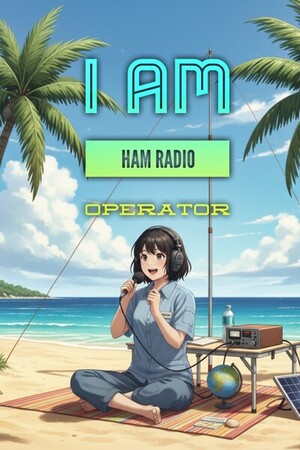Chapter 34:
Chapter 34: The Digital Divide
I am Ham Radio Operator
My return to the world of CW and SSB does not mean I abandon FT8. Instead, I begin to seek a balance, a personal philosophy that can accommodate both the sterile efficiency of the new modes and the rich humanity of the old ones. This internal struggle soon finds a voice in the conversations I have with my team, who are all wrestling with the same questions. Our weekly video calls transform from contest strategy sessions into lively, late-night philosophical debates.
The divide is clearest between Gregory and Samuel. They represent the two poles of the amateur radio world.
"I just do not see the appeal," Gregory says one evening, his face a kind, craggy map of gentle confusion on my screen. "I got my license to talk to people, to make friends. I have friends in Japan I have been talking to on Morse code for forty years. I know their children's names. I know when they have been sick. How can you get that from a 15-second computer message?"
Samuel, leaning so close to his webcam that his face is a distorted close-up, counters immediately. "Gregory, you are missing the point! It is a different kind of communication. It is not about conversation; it is about detection. It is about proving that a connection is possible under impossible conditions. It is a pure engineering challenge. When I make a contact with a signal that is 24 decibels below the noise, I am having a conversation with the universe. I am proving a scientific principle. That, to me, is just as beautiful as asking about someone's grandkids."
Doretha, ever the pragmatist, tries to find the middle ground. "Why does it have to be either/or? Think of it like social media. Sometimes you write a long, thoughtful email to a friend. Other times, you just 'like' their photo. One is a deep connection, the other is a quick, simple acknowledgment. Both are forms of communication. FT8 is the 'like' button of ham radio."
I find myself agreeing with all of them. I understand Gregory's yearning for the human touch. I feel the same thrill as Samuel at the technical achievement. And Doretha's analogy makes perfect sense. But my own perspective is colored by my recent experience of obsessive, isolating operating.
"The danger," I say, choosing my words carefully, "is that the 'like' button is too easy. It is too addictive. You can get so focused on collecting likes that you forget to have the real conversations. You can end up with ten thousand connections, but not a single friend."
My own words hang in the air, a stark admission of how far I had strayed.
From this debate, I begin to formulate a new idea, a new way of thinking about the hobby's future. The problem is not FT8 itself, but how it is perceived. The old guard sees it as a threat, a soulless replacement for "real" radio. But what if it is not a replacement? What if it is a gateway?
I think about the kids in our Project QSO program. For them, the biggest barriers to entry are often "mic fright" - the fear of talking to strangers - and the steep learning curve of things like Morse code. The technical aspects of electronics and antennas are fun for them, but the actual on-air part can be intimidating.
"What if we are looking at this all wrong?" I propose to the team. "What if FT8 is the perfect 'on-ramp' for a new generation? Think about it. It is a computer-based mode, which is second nature to them. It is text-based, so there is no mic fright. And it provides instant gratification. A kid can sit down, click a mouse, and within minutes, they have a confirmed contact from another continent. That is the magic. That is the hook."
Samuel's eyes light up. "You are right. It is the proof of concept. It proves that the magic of radio propagation is real. Once they are hooked by that, then we can introduce them to the other modes."
"Exactly," I say, my own excitement growing. "We use FT8 to get them in the door. We show them the magic of making a global connection with a simple piece of wire. Once they have that taste, once they have their first QSL card on the wall, then we say, 'Now, would not it be cool to actually talk to that person?' Then we introduce them to SSB. Or, 'Would not it be cool to do this with a signal so efficient it is like a whisper?' Then we introduce them to CW."
My philosophy is born from my own experience. My journey started with a need for connection, devolved into a hunger for collection, and is now settling into a desire for contribution. FT8 is not the destination. It is the first step on the journey. It is a tool, and like any tool, its value is determined by how you use it. You can use it to build a lonely, hollow wall of achievements, as I did. Or you can use it to build a bridge, a wide, welcoming bridge for a whole new generation to cross over into the wonderful, diverse world of amateur radio.
The digital divide, I realize, is not between the new modes and the old. It is between a closed mindset and an open one. It is about embracing change not as a threat, but as an opportunity. It is about seeing a new piece of technology not as the end of tradition, but as the beginning of a new one.




Please sign in to leave a comment.